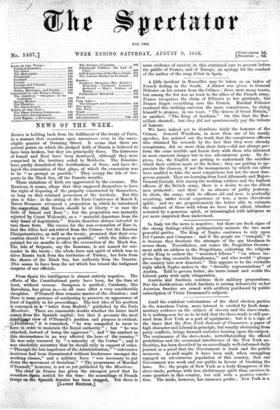From Spain the intelligence is almost entirely negative. The efforts
of the Constitutional party have been, for the time at least, without success. Saragossa is pacified ; Catalonia, like
Barcelona, has given all eases after a very considerable slaughter. O'Donnell thus remains master of the situation ; and there is some pretence of continuing to preserve an appearance at least of legality in his proceedings. The best idea of his position is conveyed in b. "letter from Madrid," published by the Paris Moniteur. There are reasonable doubts whether the letter itself conies, from the Spanish capital ; but that it presents the most intelliAhnt view of O'Donnell's position and purpose is evident. *Doubtless," it is remarked, "he was compelled to recur to "force in order to maintain the Royal authority " ; but "he was attacked, instead of being the aggressor " ; and "his conduct in this circumstance in no way affected the laws of the country." He was only censured by "a minority of the Cortes " ; and it was absolutely neeesbary that he should rally in support of order. "Through the late impotence of the Administration," "subversive doctrines had been disseminated without hinderanee amongst the working classes," and a military force "was necessary to put down the movement of Socialism." "The programme of Marshal O'Donnell," however, is not as yet published by the Moniteur. The chief in France ,has given the strongest proof that he considers Spain settled for the time : the assemblage of French troops on the Spanish frontier has been stopped. Yet there is
some evidence of anxiety in this continued care to present before the public of France, and of Europe, an apology for the conduct of the author of the coup d'etat in Spain.
























